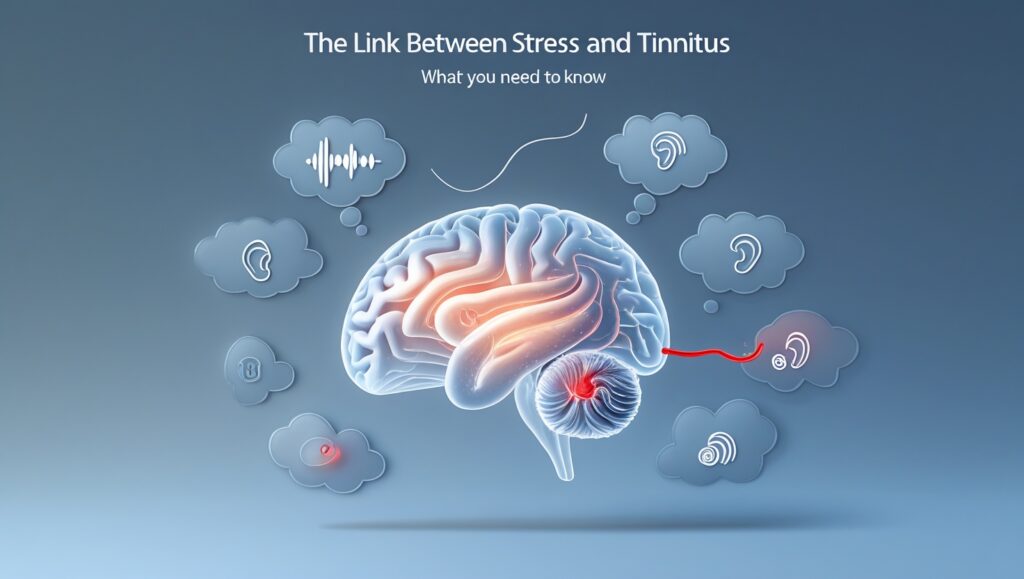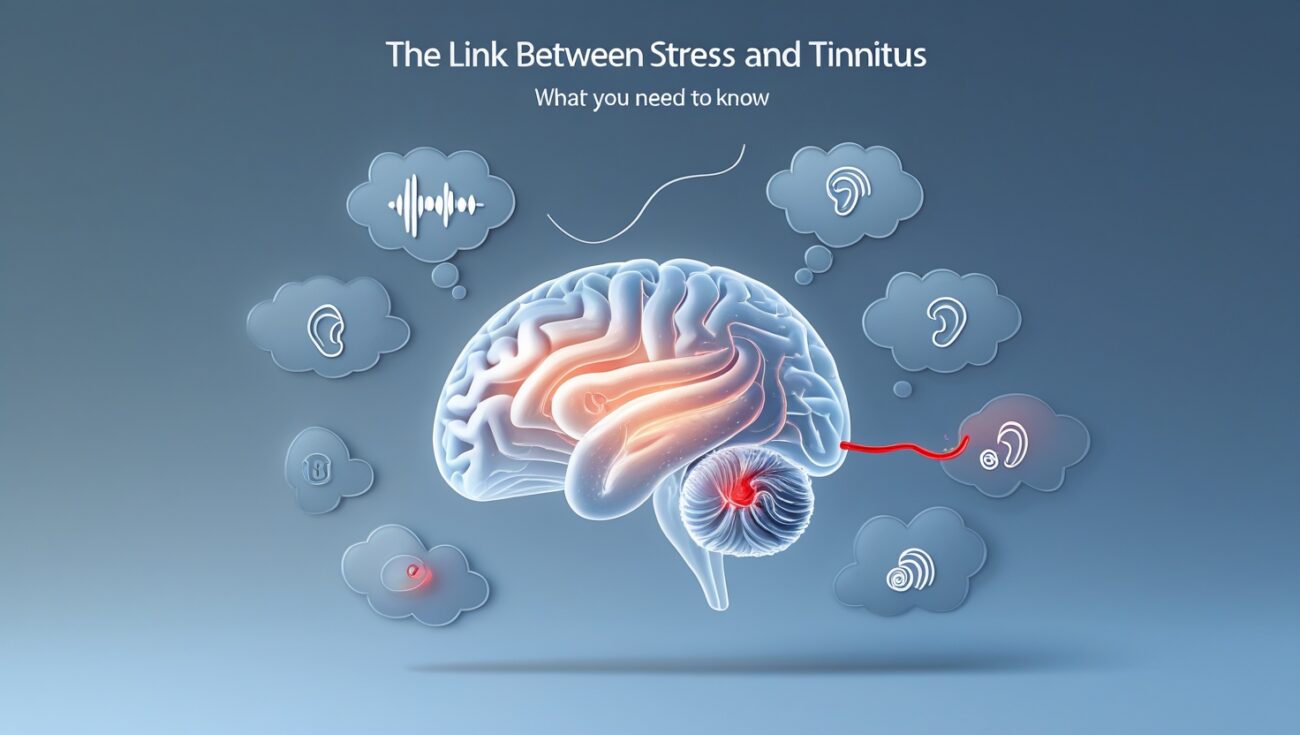The Link Between Stress and Tinnitus: What You Need to Know
When I first started dealing with tinnitus, I had no idea how much stress was making things worse. Like many people, I thought the ringing in my ears was purely a physical issue — but the more I learned (and experienced), the clearer it became: stress and tinnitus are deeply connected.
If you’ve ever noticed your tinnitus gets louder during stressful times, you’re not imagining it. In this post, I’ll break down why stress makes tinnitus worse, and what you can do to calm both your mind and the ringing in your ears.
I’ll also share the natural supplement that helped me tremendously when I was struggling — Quietum Plus. If you want to support your ear and nerve health naturally, it’s worth checking out.

Table of Contents
How Stress Impacts Tinnitus
The connection between stress and tinnitus is very real — and it’s backed by science. When we’re stressed, our body releases stress hormones like cortisol and adrenaline. These chemicals can make us more sensitive to sound, heighten anxiety, and increase how strongly the brain perceives the ringing.
For me, this was a vicious cycle:
- The more stressed I was, the louder my tinnitus became.
- The louder it became, the harder it was to sleep.
- Lack of sleep made me even more stressed — and the cycle would repeat.
Why Your Nervous System Matters
Here’s what finally clicked for me: tinnitus isn’t just an ear problem — it’s a nervous system problem too. When your nervous system is stuck in “fight or flight” mode from chronic stress, it makes the brain hyper-aware of internal sounds like ear ringing.
Once I started working on calming my whole body (not just my ears), my symptoms improved dramatically.
Simple Ways to Reduce Stress and Calm Tinnitus
1. Practice Relaxation Every Day
One of the most powerful tools I’ve found is deep breathing. Just five minutes of slow, deep breaths can lower cortisol levels and help settle the nervous system. I do this before bed — and it really helps lower the intensity of my tinnitus.
2. Get Regular Exercise
Moving your body helps flush out stress hormones and balances your mood. I aim for 30 minutes of light exercise most days — walking, yoga, or stretching all help reduce tinnitus caused by stress.
3. Create a Calm Evening Routine
Bedtime routines matter more than you think. A warm bath, reading a book, listening to soothing sounds — anything that helps you unwind will also help quiet your mind and your ears.
4. Support Your Body Naturally
After trying all kinds of remedies, the one thing that helped me the most was adding a natural tinnitus support supplement: Quietum Plus.
It’s packed with ingredients that calm the nervous system and support healthy hearing — I noticed a big difference in my stress levels and my ear ringing within a few weeks.
Final Thoughts
If you take one thing from this post, it’s this: stress and tinnitus go hand in hand.
When I ignored my stress, my tinnitus was relentless. But when I made managing stress a priority — through relaxation, exercise, sleep, and supplements like Quietum Plus — I finally started to get my life back.
You can too. It takes a little time and patience, but calming your nervous system really is the key to quieting your tinnitus.
One thing I also realized is that chronic stress builds up in your body if you don’t give it a way out. I used to think I could just “power through” stressful days — but all that tension made my tinnitus worse. Now, I’m much more intentional about taking breaks and decompressing.
I also found that journaling helped a lot. Writing out my worries at night cleared my mind, lowered my stress, and surprisingly, helped quiet my ears. It’s a simple tool anyone can use.
Did you know that tight neck and jaw muscles often contribute to tinnitus — and stress makes those muscles tighter? I started adding gentle neck stretches and jaw relaxation before bed, and it’s made a big difference in calming my tinnitus.
Another key factor is blood sugar. Stress spikes blood sugar levels — and blood sugar swings can make tinnitus symptoms worse. I started eating more balanced meals with protein, healthy fats, and fiber — and my evenings became much calmer.
One overlooked factor for many people is caffeine sensitivity. During stressful periods, I noticed that my usual cup of coffee made my tinnitus scream. Cutting back on caffeine was hard at first, but it really helped lower both my stress and the ringing.
Magnesium is one supplement that made a world of difference for me. It’s known to help calm the nervous system and reduce stress. Once I started taking magnesium before bed, I noticed my stress-induced tinnitus was much quieter.
Sleep was another major piece of the puzzle. When I wasn’t sleeping well, my stress levels spiked — and so did my tinnitus. That’s why I worked hard on building a better bedtime routine, and why I started using Quietum Plus to support both my ears and my nervous system.
Breathing exercises became part of my nightly ritual. I follow a simple 4-7-8 breathing method: inhale for 4 seconds, hold for 7, exhale for 8. Doing this for 5-10 minutes has a noticeable calming effect on my tinnitus.
Sound therapy was another trick I picked up along the way. I play gentle nature sounds or low-level white noise in the background at night — it helps distract my brain from the ringing and promotes relaxation.
Getting outside into nature also helped lower my stress. A daily walk outdoors — even just 20 minutes — brought my stress down, helped my mood, and ultimately improved my tinnitus symptoms.
I also switched to blue-light-blocking glasses in the evenings. Less screen time and reduced blue light exposure helped me wind down faster — and as a result, the ringing wasn’t as sharp at bedtime.
Hydration matters too! When I was dehydrated, my tinnitus was noticeably louder. Now, I make sure to drink plenty of water throughout the day — and my ears thank me for it.
One big mindset shift was learning to stop “fighting” the sound. When I accepted it instead of resisting, my stress went down — and so did the volume of the tinnitus.
Another surprising factor is gut health. When I started taking probiotics and eating more gut-friendly foods, I noticed I had fewer overall stress symptoms — which included less intense tinnitus.
For me, using adaptogenic herbs like ashwagandha also helped. They support your body’s stress response, and after a few weeks of use, I felt calmer — and my tinnitus wasn’t as disruptive.
Keeping my bedroom cool and dark also helped improve sleep. Better quality sleep equals lower stress, and that helps calm the nervous system and reduce tinnitus over time.
Lastly — I can’t stress enough the importance of a holistic approach. You have to address both the body and the mind. Using Quietum Plus alongside these lifestyle changes was the turning point for me — my stress is down, my sleep is better, and my ears are finally quiet most nights. Check it out here.

